*Salon registration is closed. No on-site registration.
Salons are small-group discussions on key topics in ethnographic practice. Facilitated by hosts who inspire reflection and engagement—sometimes using exercises or activities—they offer a space where conference attendees share candidly and experiment with evolving ideas.
Program
All Salons are Sunday, 10 November, 12:45–1:45. Pick up a box lunch in Market Square Tent before going to your Salon!
When Not to Design AI: Assessing and Addressing the Ethical Implications of Research
Hosts: Martha Bird (ADP) & Abbas Jaffer (Facebook)
Washington Building, 20 Washington Place, Room 128A
description
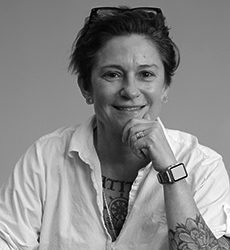 Salon host Martha Bird is a Business Anthropologist in ADP’s Roseland Innovation Lab, working with global brands to create meaningful services, experiences, and products. She supports innovation to ensure future generations of HCM technologies are informed by the wisdom of human cultures and the everyday encounters out of which new practices take shape and transform the way we work.
Salon host Martha Bird is a Business Anthropologist in ADP’s Roseland Innovation Lab, working with global brands to create meaningful services, experiences, and products. She supports innovation to ensure future generations of HCM technologies are informed by the wisdom of human cultures and the everyday encounters out of which new practices take shape and transform the way we work.
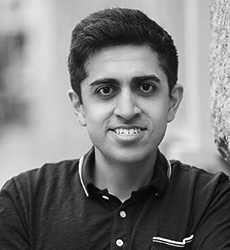 Co-host Abbas Jaffer is a UX Researcher at Facebook working the with the Civic Integrity team. He is ABD in anthropology and holds a Masters degrees in anthropology and Islamic studies from Harvard. In his career Abbas has worked with large corporations, startups, universities, and NGOs in sectors including consumer tech, media, mobile telecom, financial services, and education.
Co-host Abbas Jaffer is a UX Researcher at Facebook working the with the Civic Integrity team. He is ABD in anthropology and holds a Masters degrees in anthropology and Islamic studies from Harvard. In his career Abbas has worked with large corporations, startups, universities, and NGOs in sectors including consumer tech, media, mobile telecom, financial services, and education.
Honoring the Unforeseen
Host: Anna Wojnarowska (Google)
Washington Building, 20 Washington Place, Room 128B
description
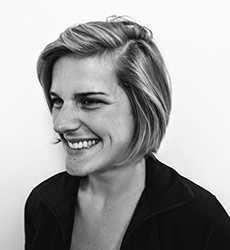 Salon host Anna Wojnarowska is a User Researcher at Google working on Google Fit. Making use of her academic background in anthropology and psychology, her work focuses on identifying the true value and role of technology within constrained or challenging environments where “official” systems fail.
Salon host Anna Wojnarowska is a User Researcher at Google working on Google Fit. Making use of her academic background in anthropology and psychology, her work focuses on identifying the true value and role of technology within constrained or challenging environments where “official” systems fail.
Speaking Truths to Power
Hosts: Chelsea Mauldin (Public Policy Lab) & Natalia Radywyl
Washington Building, 20 Washington Place, Room 302
description
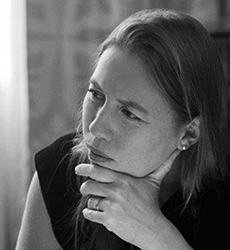 Salon co-host Chelsea Mauldin is a social scientist and designer. She directs the Public Policy Lab, a New York City nonprofit organization that designs better public policy and services for low-income and at-risk Americans. She is a graduate of the University of California at Berkeley and the London School of Economics.
Salon co-host Chelsea Mauldin is a social scientist and designer. She directs the Public Policy Lab, a New York City nonprofit organization that designs better public policy and services for low-income and at-risk Americans. She is a graduate of the University of California at Berkeley and the London School of Economics.
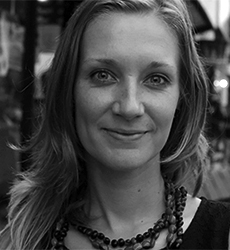 Co-host Natalia Radywyl, PhD, is an academic and design consultant specializing in applied research, design, and social innovation. She has worked with clients from Fortune 500 to government and NGOs. She’s passionate about bringing true rigor, creativity and integrity to design consulting.
Co-host Natalia Radywyl, PhD, is an academic and design consultant specializing in applied research, design, and social innovation. She has worked with clients from Fortune 500 to government and NGOs. She’s passionate about bringing true rigor, creativity and integrity to design consulting.
Supporting Advanced Practitioners: Value, Impact, and Leadership
Host: Tracey Lovejoy (Catalyst Constellations)
Washington Building, 20 Washington Place, Room 310
description
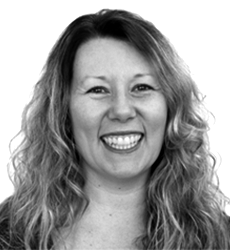 Salon host Tracey Lovejoy is a coach who supports Catalysts and their teams, and is the researcher behind the Catalyst movement. Before she became a coach, Tracey spent 12 years at Microsoft as an ethnographer and leading teams of change makers. She is also the co-founder of EPIC and teaches the popular EPIC course Maximizing Your Impact as a Change Agent.
Salon host Tracey Lovejoy is a coach who supports Catalysts and their teams, and is the researcher behind the Catalyst movement. Before she became a coach, Tracey spent 12 years at Microsoft as an ethnographer and leading teams of change makers. She is also the co-founder of EPIC and teaches the popular EPIC course Maximizing Your Impact as a Change Agent.
Agency through Appropriation: Does User Centered Design Diminish Agency?
Host: Margaret Morris (University of Washington Seattle)
College Building, 2 College Street, Room 346
description
 Salon host Margie Morris is a clinical psychologist and technology researcher. She is the author of Left to Our Own Devices (MIT Press), has published in leading psychology and HCI journals, and has invented a number of systems for emotional wellbeing. Her work has been featured in the New York Times, NPR, and EPIC Perspectives.
Salon host Margie Morris is a clinical psychologist and technology researcher. She is the author of Left to Our Own Devices (MIT Press), has published in leading psychology and HCI journals, and has invented a number of systems for emotional wellbeing. Her work has been featured in the New York Times, NPR, and EPIC Perspectives.
Failing Fast: Adapting to Agile
Hosts: Thomas Oder (Wells Fargo); Jenna Hammer (Zillow); Melissa Vogel (Clemson University)
College Building, 2 College Street, Room 410
description
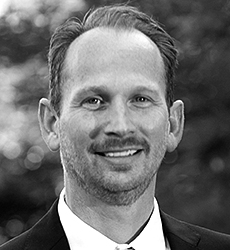 Salon Host Thomas Oder is an Agile Change Agent at Wells Fargo and Business Mentor at Everwise. He has previously worked on Agile teams at Staples and Volvo. Thomas is focused on helping UX teams adapt to the Agile software development lifecycle while facilitating a cultural shift to embrace customer centric strategy and design.
Salon Host Thomas Oder is an Agile Change Agent at Wells Fargo and Business Mentor at Everwise. He has previously worked on Agile teams at Staples and Volvo. Thomas is focused on helping UX teams adapt to the Agile software development lifecycle while facilitating a cultural shift to embrace customer centric strategy and design.
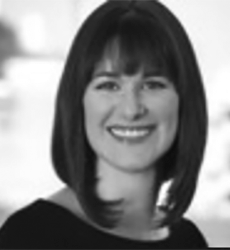 Co-host Jenna Hammer has spent 15 years in UX research, largely conducting research on personal finance for U.S. Bank and Wells Fargo. She currently leads a research team at Zillow Group. She’s interested in helping researchers have the fluency and positioning to ensure business decisions are informed by customer needs.
Co-host Jenna Hammer has spent 15 years in UX research, largely conducting research on personal finance for U.S. Bank and Wells Fargo. She currently leads a research team at Zillow Group. She’s interested in helping researchers have the fluency and positioning to ensure business decisions are informed by customer needs.
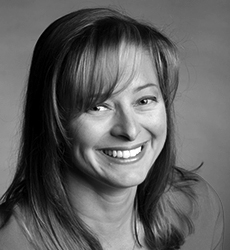 Co-host Melissa Vogel is Director of the Business Anthropology program at Clemson University and a Principal at Great Heron Insights. She has 25 years of mixed methods research experience, currently focused on improving corporate approaches to qualitative research and training applied social science researchers.
Co-host Melissa Vogel is Director of the Business Anthropology program at Clemson University and a Principal at Great Heron Insights. She has 25 years of mixed methods research experience, currently focused on improving corporate approaches to qualitative research and training applied social science researchers.
Design, Ethnography, and Foresight: Building Practices for the Long Term
Hosts: Lyn Jeffery (Institute for the Future) & Neil Collman (Nile)
College Building, 2 College Street, Room 412
description
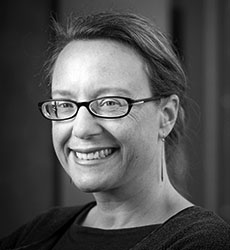 Salon host Lyn Jeffery leads foresight training at the Institute for the Future (IFTF), an independent, non-profit futures research and education organization based in Palo Alto, Callifornia. A cultural anthropologist by training, Lyn designs and delivers learning experiences and strategic foresight research for large institutions seeking to better navigate change.
Salon host Lyn Jeffery leads foresight training at the Institute for the Future (IFTF), an independent, non-profit futures research and education organization based in Palo Alto, Callifornia. A cultural anthropologist by training, Lyn designs and delivers learning experiences and strategic foresight research for large institutions seeking to better navigate change.
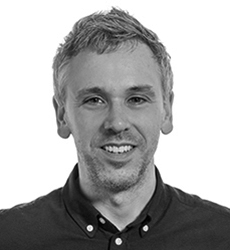 Co-host Neil Collman is a design leader, speaker and service design practitioner who cares about making an impact for people and profit. He heads up the consulting practice at leading UK strategic design consultancy Nile where he develops ethnographic methods and offerings to stay at the forefront of the industry.
Co-host Neil Collman is a design leader, speaker and service design practitioner who cares about making an impact for people and profit. He heads up the consulting practice at leading UK strategic design consultancy Nile where he develops ethnographic methods and offerings to stay at the forefront of the industry.
Intersectional Design Research
Host: Lindsey Wallace (Adobe)
College Building, 2 College Street, Room 424
description
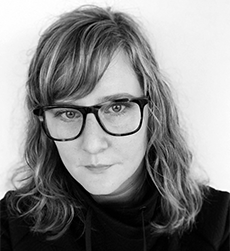 Salon host Lindsey Wallace, PhD, is a Senior Researcher at Adobe Design. A feminist anthropologist and systems thinker, she uses observation and ethnography to understand individuals in their broader contexts, providing insights into the cultures and values that shape users’ interactions, problems, and experiences.
Salon host Lindsey Wallace, PhD, is a Senior Researcher at Adobe Design. A feminist anthropologist and systems thinker, she uses observation and ethnography to understand individuals in their broader contexts, providing insights into the cultures and values that shape users’ interactions, problems, and experiences.
Clowns to the Left and Jokers to the Right: Getting “Unstuck in the Middle” with Ethics
Hosts: Nikki Lavoie (MindSpark); Josh Dresner (SPARCK) & Frank Romagosa (HiRoad)
College Building, 2 College Street, Room 442
description
 Salon host Nikki Lavoie, Founder & CEO of MindSpark Research International, is a qualitative specialist who translates her passion for understanding people into strategic insight. She combines ethnographic and digital techniques in a cross-cultural context and has written and presented on the power of language and culture in research.
Salon host Nikki Lavoie, Founder & CEO of MindSpark Research International, is a qualitative specialist who translates her passion for understanding people into strategic insight. She combines ethnographic and digital techniques in a cross-cultural context and has written and presented on the power of language and culture in research.
 Co-host Josh Dresner is a digital consultant at SPARCK, the design company of BJSS, the leading independent IT and business consultancy in the UK. He holds a Masters in anthropology and people-centered business from the University of Copenhagen and previously worked at Claro Partners in Barcelona.
Co-host Josh Dresner is a digital consultant at SPARCK, the design company of BJSS, the leading independent IT and business consultancy in the UK. He holds a Masters in anthropology and people-centered business from the University of Copenhagen and previously worked at Claro Partners in Barcelona.
 Co-host Frank Romagosa is the Senior Design Researcher at HiRoad, an insurtech private start-up that re-engineers insurance by rewarding and empowering mindful living. He is an anthropologist, strategic planner and design researcher who has led cross-functional teams in a broad range of digital strategy and innovation projects.
Co-host Frank Romagosa is the Senior Design Researcher at HiRoad, an insurtech private start-up that re-engineers insurance by rewarding and empowering mindful living. He is an anthropologist, strategic planner and design researcher who has led cross-functional teams in a broad range of digital strategy and innovation projects.
